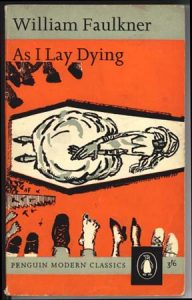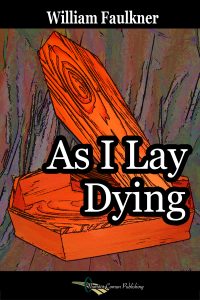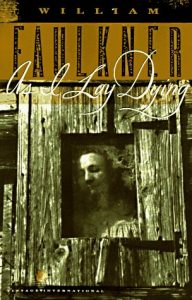As I Lay Dying – William Faulkner – 1930
Posted by guillermo maynez on 23/8/2013, 10:30:45
The more I read Faulkner, the more I like his books. There’s something very mysterious in his literature: although he seems to rejoice in sordidness, fatality, despair, poverty, and violence of different sorts, he transforms the sorry human condition into verbal constructions of incredible beauty. His world is savage, never corrupted by modernity yet absolutely corrupted by misery and a version of religion whose primitiveness would have astonished an ancient Babylonian, not to speak of the Greeks or the Romans.
It takes the whole book to find out that the narrative key is hidden within the twisted, egomaniac psyche of Anse Bundren. But the psychological key lies with Darl, the only voice of sanity in that world. But, of course, the terms sanity and insanity may be turned upside down: if you’re the only sane person, then you are insane and it is everybody else who define the rules of sanity.
Another simile that keeps coming back to my mind every time I read Faulkner is Greek tragedy. Fatality runs unperturbed even when anyone can see where it’s heading to. If rivers have destroyed bridges, and the heat and humidity are so high, it’s inevitable that the corpse will be corrupted, smelly and decomposed way before they get to Jefferson. But one has only to respect Anse for stubbornly keeping his promise to his deceased wife, that she will be buried by her relatives’ side. Until we find out…
“As I Lay Dying” is a wonderful achievement of literary technique, which also does not detract from story and plot. The 59 chapters of alternate and irregular narration contribute, like “punctilism” in painting, to an aggregate of voices (or points of color) which together weave a vast canvass of literature to tell us a story of despair, illegitimacy, inadequacy and damnation. But, oh, with a magnificent array of voices and a mastery of language within a style like no one else’s.



Reviewed by: Chris Green Date: 25 October 2001
Faulkner’s As I Lay Dying proves the claim that the stream-of-consciousness style of prose can be a genuinely beautiful artform. In a sublime mixture of inventive verbage and character transformations amid a sorrowful tale of a family’s journey, Faulkner, in my opinion, leaves us with his crowning literary jewel.
As I Lay Dying tells the story of a family’s journey through rural Mississippi while carrying the body of their recently deceased matriarch. Told from each person’s perspective (each change of perspective is signaled by a new chapter – very helpful) the effect of the matriarchs death on the family members ranges from uncomprehending (the youngest grandchild) to resentful (one of her sons with whom she was very close) to relieved (her husband). In one brief chapter we are even treated to the dead woman’s own thoughts.
Faulkner’s famous stylings are quite toned-down in this work. None of the convoluted prose replete with over-intellectualized ramblings which make works like ‘The Sound and the Fury’ poor reads, are present. Instead, As I Lay Dying is eminently readable enough to be fun, yet at the same time is challenging enough to be rewarding.
This book has assumed its place as my favorite Faulkner novel and deserves a mention as one of the top 20 of the best books I’ve ever read.